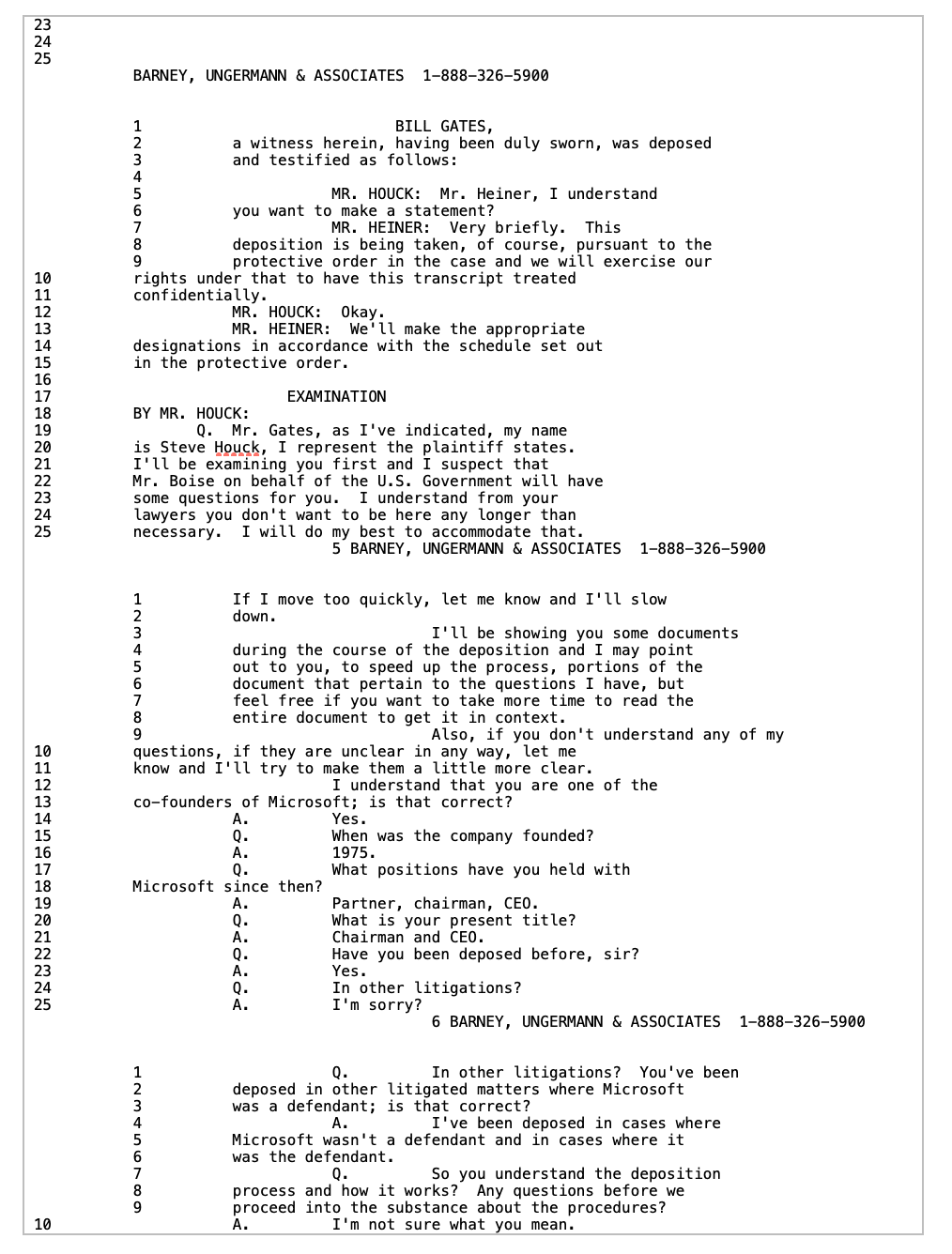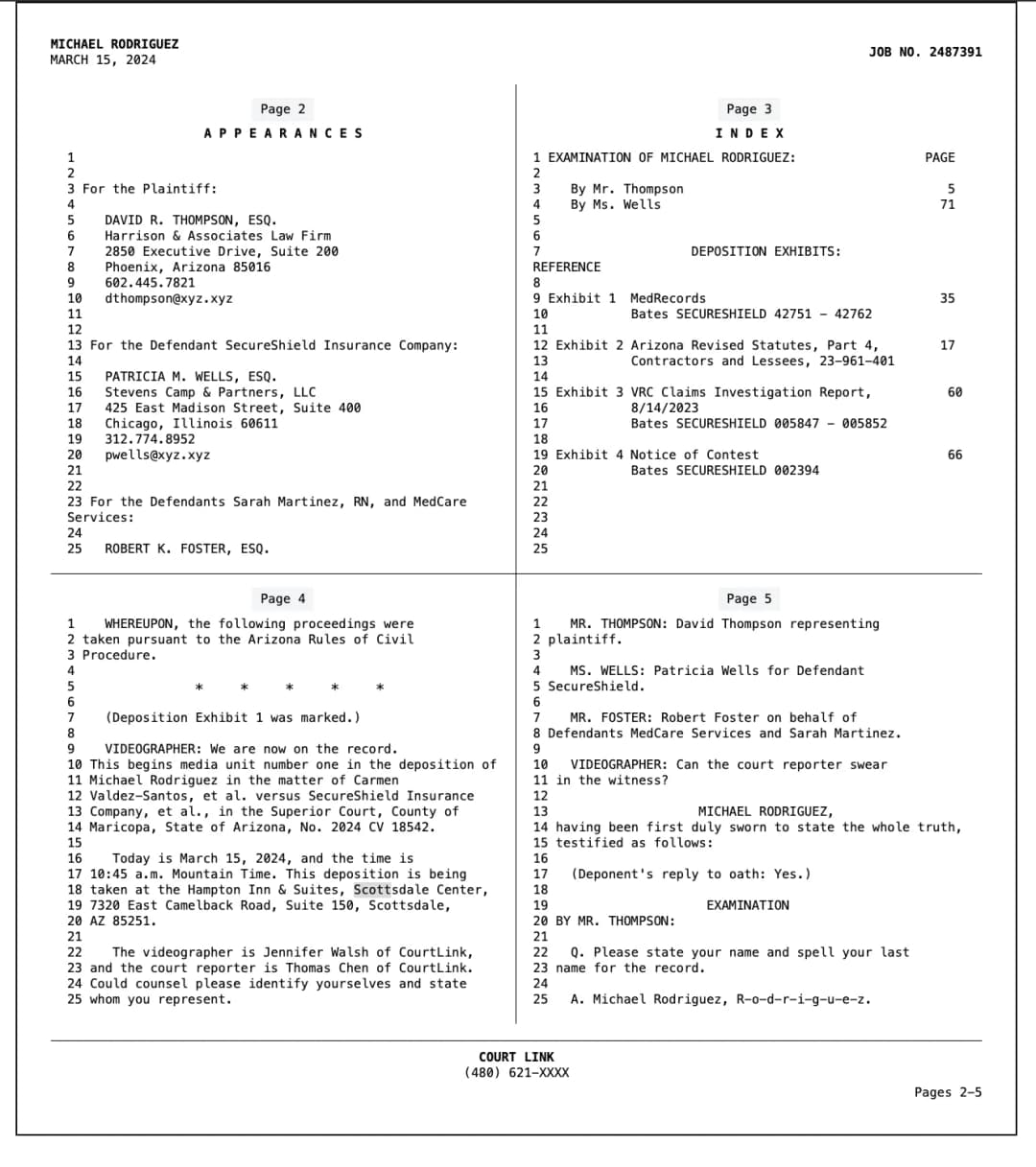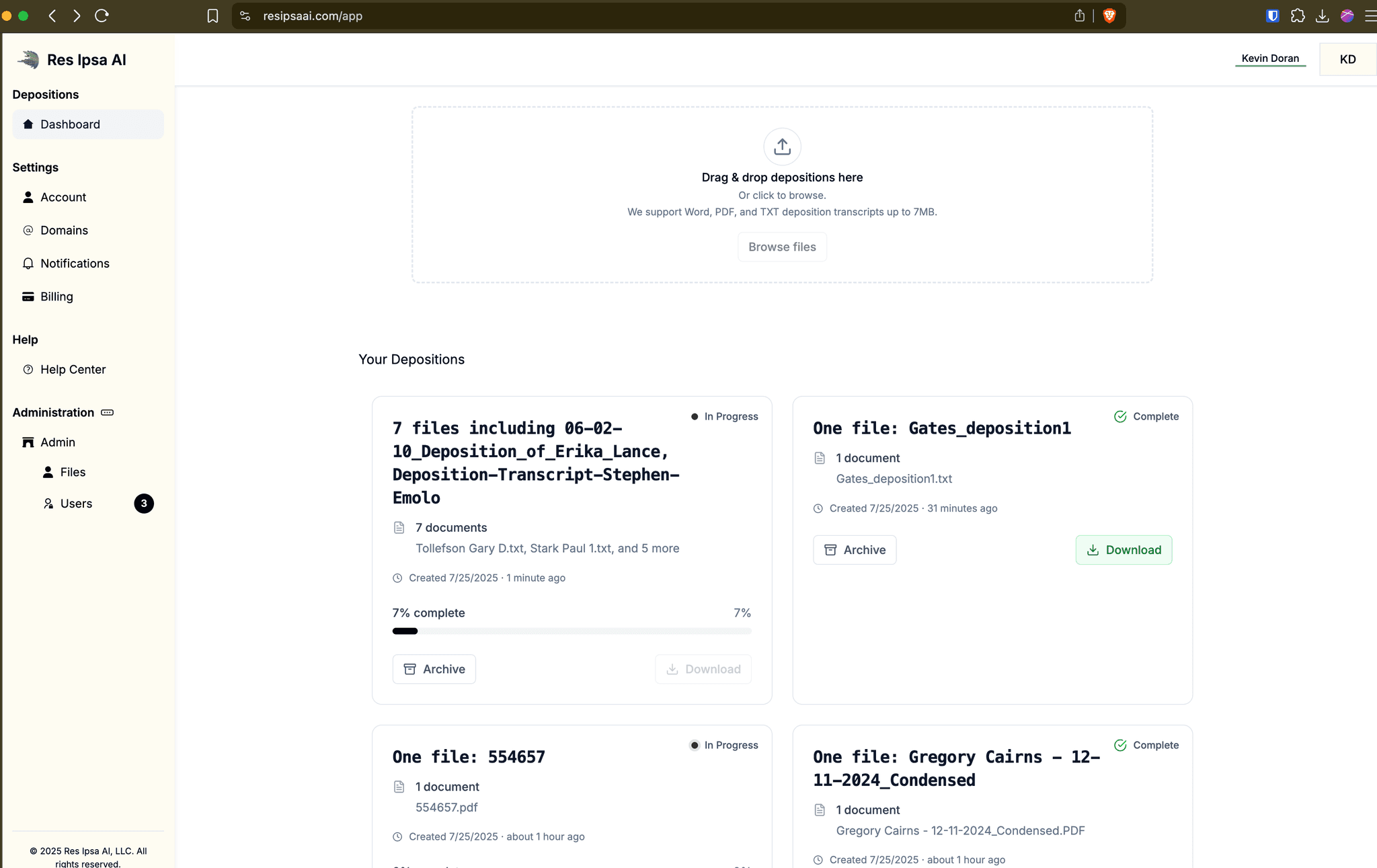All in a single PDF, Res Ipsa takes a deposition transcript and creates a link-enabled summary - allowing you to toggle back and forth between the high level recap and details in the full transcript.

Interesting formats from your transcript provider? We've got you covered. Res Ipsa AI can handle PDFs, word docs, txts, and the infamous mini.


Instead of forcing you to live on a web platform to do your work, Res Ipsa AI focuses on getting you in and out -- delivering PDF files available offline on your harddrive.

What Does a Deposition Summary Look Like?
As we experimented with summaries, we had to develop software that would provide an acceptable level of detail. On average, our deposition summaries produce about paragraph of text per deposition page. This means that a 100-page deposition is reduced to about 10 pages. Although many deposition summaries are done by page and line, we learned that having a summary that was written in paragraph form is much more natural and easier to read. We also learned that if we produce summaries that are grouped in 5-page segments, it provides the level of detail needed to quickly go to the right spot in the full deposition text to then review in detail.
The result is that you can quickly learn the contents of a deposition, then flip right to the page range that matter for your work that day. You can see examples of the summaries here.
What Can I Expect in Terms of Quality?
AI generates summaries that have no bias. The AI isn’t reading the deposition with the history of discovery fights, dislike of a witness, or confirmation bias. As a result, AI summaries avoid the bias that can influence summaries. That said, AI summaries are not perfect. You may read them, then read the deposition, and think you would have omitted a detail that the AI included, or that you would have added a detail that the AI omitted. Those are limitations of AI, and in general, the limitations of people too.
The goal of a summary is not to be so detailed you could cite it to a court (after all, citing a summary of a deposition is probably malpractice). The goal of a deposition summary is to help you know what pages to read carefully and cite, and which pages don’t have anything related to what you’re looking for. AI summaries, when trained properly and built with the proper code, can do that.
And we've made it even easier. Read our summary. Find a part that is important. Click and go straight to the transcript.
But Can't I Just do it myself?
You might think, “If you are using AI, can’t I just do it myself?” The short answer is, “Yes, you can. But it will take a long time, it won’t be great, and it will still cost more than Res Ipsa AI.”
If you take a whole deposition and dump it in ChatGPT or a similar NLP, what will happen? It will error out and tell you that you have exceeded the length requirements. ChatGPT can only take so many tokens at once (tokens are a weird way they talk about word limits). So, you have to cut the text up. But ChatGPT doesn’t count the words the way Microsoft Word does. So, even if you cut up the text, it will often error again. Once you start cutting the text shorter, you’ll get less errors. But ChatGPT, if prompted to summarize, will do it almost too well. It will cut it down to a paragraph, and that paragraph doesn’t have enough detail to help. So, you’ll play with the detail and the prompt to ChatGPT, asking different levels of detail. And then, you’ll get a summary of a few pages. Then, when you feed ChatGPT the next few pages, it will start to summarize the whole deposition again, not just the new part. That’s a problem that can be overcome, but it isn’t obvious or easy.
These are problems that can be solved, but they require someone who is paying attention, and checking the output. And by the time you have someone do that work, you could have use Res Ipsa AI for less than you spent on the time to do the work. Indeed, even if you trained someone to do it well, it would still be cheaper to use Res Ipsa AI. That’s the power of expensive, powerful computer code.
And that is what we invested in building.
How Will This Help Me Make Money and Save Time?
The current going rate to hire someone to summarize depositions is about $2 per page, making a 100-page deposition a $200 cost. Maybe you’re thinking, “That’s absurd. I don’t pay anyone. We do it in the office.” Ok. Even if you have a paralegal summarize a deposition, assuming you pay them a salary that costs you a total of $75,000 (benefits, taxes, etc.), you are paying about $30 per hour. So, if they summarize a 100-page deposition, and do it in two hours, you still paid $60 for the summary. If your associate attorneys do the work, the cost is even higher (likely at least $120). And if you aren’t summarizing depositions at all, and are just reading them all yourself, the costs in time and money are truly immense.
Our deposition summaries cost $4.95 per summary, regardless of the length. So, even a 200-page deposition that would cost you between $120 (paralegal) and $400 (outsourcing to a company) will cost you $4.95.
But you save a lot more than the cost of the deposition. Imagine the next time you retain an expert what you’ll save if you can send clean summaries of all relevant depositions, with your highlights regarding the important parts. Our co-counsel recently received a bill from an expert for $55,000, in which 2/3 of it was review of the records. They were in a crunch, and so they sent the expert all the depositions and most of the file, without much direction. Imagine what they would have saved, in that one exchange, if they could have sent AI summaries (no claims by the other side these are biased) and been able to direct the expert to the content that relates to topics of interest. Paying $20 for 20 deposition summaries could have saved tens of thousands of dollars.
Deposition summaries won’t just save you money. They’ll help you make it too. This can happen in many ways. Imagine you develop an office practice that each time a deposition is taken, when the transcript comes in, it is uploaded to Res Ipsa AI so you have a clean summary. You can send those summaries to clients to keep them in the loop. They’ll feel connected and informed, but the time spent for you is literally the less than one minute it took to go to the site and upload the deposition. Happy clients create referrals, they don’t file claims, and they listen when you give advice.
There are other almost daily ways Res Ipsa AI will help you get better results and earn more. Imagine getting ready for summary judgment and being able to immediately zero in on the relevant parts of the deposition, avoiding the pages of introduction, background, irrelevant topics, or tangents. You’ll write better motions, and you’ll write them in less time. The same is true for trial prep. No attorney should go to trial without a command of every deposition taken in the case. That job is made much easier if you can read the summaries first, identify the page ranges of importance, and then focus on the essential portions.
In sum, Res Ipsa AI saves time and makes money. It is one powerful way to “Simplify the Legal Hustle with AI muscle.”